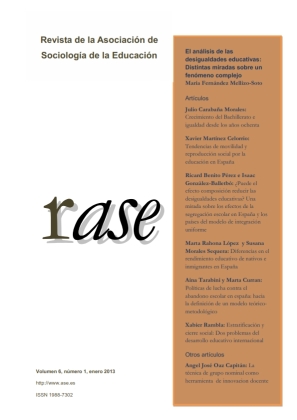¿Puede el efecto composición reducir las desigualdades educativas? Una mirada sobre los efectos de la segregación escolar en España y los países del modelo de integración uniforme
DOI:
https://doi.org/10.7203/RASE.6.1.8597Keywords:
educational inequalities, school segregation, composition effect, educational equality. Abstract
Abstract
This article presents a statistical simulation exercise based on 2009 PISA data where there is an exploration of the effects of a decrease in the levels of school segregation would have in both the general performance of students and the equality of the system. The results indicate that in the projections of a non-segregated scenario patently higher levels of equality would be achieved than is the case in the projections of a segregated scenario. In all the countries analysed (Spain, France, Portugal and Greece) this would reduce the differences between students from families of higher and lower socioeconomic status. The general performance presents a more ambiguously positive result in the non-segregated scenario although the majority of indicators used in the majority of countries the scores would be significantly better in such a scenario. Of the four countries analysed, Spain is the one which presents the more ambiguously positive results in terms of general performance in the non-segregated scenario.
 Downloads
Downloads
Downloads
Published
How to Cite
-
Abstract1575
-
PDF (Español)467
Issue
Section
License
![]()
This work is licensed under a Creative Commons Reconocimiento-NoComercial-CompartirIgual 4.0 Internacional.




